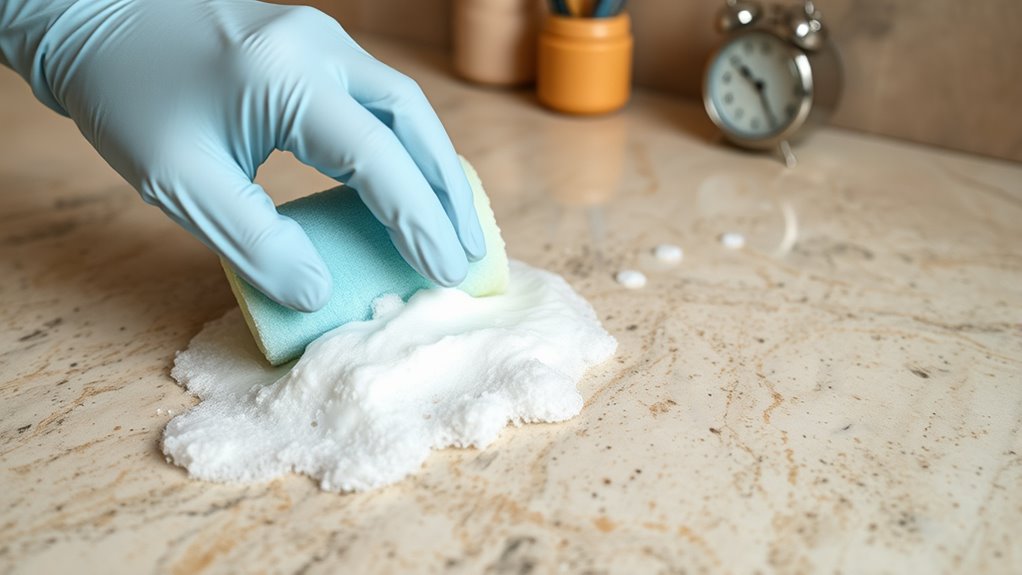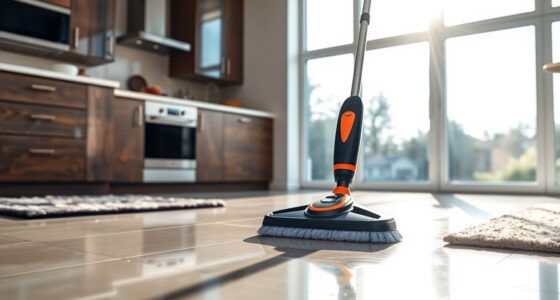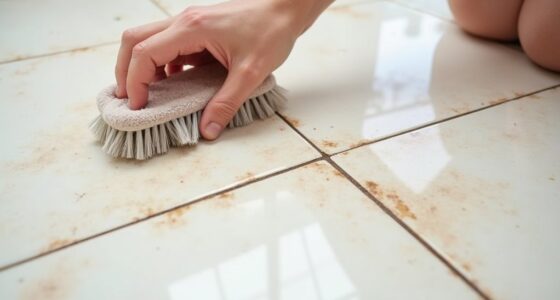To keep your natural stone surfaces looking their best, use a soft cloth or mop with pH balanced cleaners daily to gently remove surface dirt, avoiding abrasive tools. Weekly, focus on deeper cleaning with soft scrubbers and avoid harsh chemicals or excessive scrubbing that can cause micro-scratches. Monthly, inspect for buildup and use gentle, appropriate cleaners and scrubbers to maintain surface integrity. Continuing this routine guarantees long-term preservation—discover more expert tips as you learn how to care for your stone properly.
Key Takeaways
- Use soft, pH-balanced cleaners and gentle tools for daily cleaning to prevent surface scratches.
- Weekly, switch to non-abrasive scrubbers and check for buildup or stains with careful cleaning.
- Conduct monthly inspections, replace worn scrubbers, and perform deep cleaning to maintain surface quality.
- Always test cleaning solutions and tools on small areas before full application to avoid damage.
- Ensure proper tool safety and use appropriate cleaning techniques to preserve the natural stone’s appearance long-term.

Have you ever wondered if your cleaning tools might be harming your natural stone surfaces? It’s a valid concern, especially when daily routines involve scrubbers and cleaners that aren’t designed for delicate stone. To keep your surfaces looking flawless, it’s essential to understand proper scrubber care, starting with the importance of using pH balanced cleaners. These cleaners maintain the right acidity levels, preventing damage caused by harsh chemicals. When you opt for pH balanced cleaners, you reduce the risk of etching or dulling your stone’s surface, which can happen with acidic or alkaline products. Combining this with careful use of abrasive pads ensures you’re cleaning effectively without scratching or dulling the stone’s natural finish.
On a daily basis, your goal should be to remove surface dirt and prevent buildup without risking damage. Using a soft cloth or mop with a pH balanced cleaner is ideal. Avoid abrasive pads or scrub brushes that are too rough; they can scratch the surface, especially if safety isn’t a priority. If you need to tackle stubborn spots, choose pads specifically designed for natural stone or use a gentle scrubbing tool that’s safe for delicate surfaces. Always test a small, inconspicuous area first to ensure your cleaning method won’t cause harm. Remember, abrasive pad safety is paramount—if a pad feels rough or too coarse, it’s best to switch to a softer alternative. This way, you preserve the integrity of your natural stone while ensuring it stays spotless. Additionally, understanding proper cleaning techniques can further help protect your surfaces from accidental damage.
Weekly cleaning should focus on deeper dirt and stains that aren’t visible daily. Use a pH balanced cleaner and a soft, non-abrasive scrubber to gently lift grime. Avoid aggressive scrubbing or abrasive pads that could cause micro-scratches or dullness over time. Instead, opt for a scrubber designed for natural stone, or a soft-bristled brush that distributes pressure evenly. Consistently following this routine helps maintain the stone’s appearance, preventing the need for more aggressive cleaning methods later. Be cautious about adding any acidic or alkaline solutions during weekly cleans, as they can compromise the stone’s surface if used excessively.
Monthly maintenance calls for a thorough inspection and cleaning. Use a pH balanced cleaner and a gentle, non-abrasive scrubber to remove any buildup or stains that have developed. This is also a good time to check your scrubber’s safety—ensure it’s not too abrasive or worn out, as using a damaged pad can scratch your stone. Regularly replacing or upgrading your scrubbers helps prevent accidental damage. If you notice dullness or etching, consult a professional for restoration. Remember, the key to long-term beauty and durability is consistent, careful cleaning using the right tools and cleaners. By sticking to pH balanced solutions and ensuring your scrubbers are safe for natural stone, you protect your surfaces and keep them looking stunning for years to come.
Frequently Asked Questions
Can I Use Vinegar to Clean Natural Stone Surfaces?
You shouldn’t use vinegar on natural stone surfaces because it’s acidic and can damage the stone. Vinegar safety is a concern since it can cause etching and dullness, harming your natural stone maintenance efforts. Instead, opt for pH-neutral cleaners designed specifically for natural stone. This approach keeps your surfaces looking their best and guarantees you don’t inadvertently cause long-term damage. Always check manufacturer recommendations for proper cleaning methods.
How Often Should I Reseal Natural Stone Countertops?
You should reseal your natural stone countertops every 1 to 3 years, depending on sealing frequency and usage. Regularly check the surface for water absorption or dullness to determine if resealing is needed sooner. Follow your resealing schedule to maintain protection against stains and damage. Proper resealing keeps your countertops looking beautiful and extends their lifespan, so don’t neglect this essential maintenance step.
Are There Eco-Friendly Scrubber Options for Natural Stone?
Yes, you can find eco-friendly scrubber options for natural stone. Look for biodegradable scrubbers and plant-based cleaning tools, which are gentle yet effective. These options reduce plastic waste and avoid harsh chemicals that could damage your stone. Using biodegradable scrubbers helps protect the environment while maintaining your natural stone’s beauty. Opt for these sustainable tools to keep your countertops clean without compromising eco-consciousness.
What Should I Do if My Natural Stone Gets Stained?
Think of your natural stone as a treasured canvas—when it gets stained, act fast! For stain removal, gently blot with a mix of mild dish soap and water, avoiding harsh chemicals. To prevent future stains, seal your stone regularly and wipe up spills immediately. Remember, timely stain removal and diligent stain prevention keep your stone looking stunning and resilient against life’s inevitable splashes.
Is It Safe to Use Commercial Heavy-Duty Cleaners on Natural Stone?
Using commercial heavy-duty cleaners on natural stone isn’t always safe, as these products can damage the surface or cause discoloration. You should check the labels for safety concerns and guarantee they’re specifically formulated for natural stone. It’s best to opt for pH-neutral cleaners and avoid harsh chemicals. Always test a small, hidden area first to prevent any unwanted damage, ensuring your stone stays beautiful and intact.
Conclusion
Taking care of your natural stone with daily, weekly, and monthly scrubber routines is like tending a delicate garden—each task nurturing its beauty and strength. When you stay consistent, you’re weaving a protective shield around your stone, allowing its natural luster to shine like a hidden gem. Remember, your care transforms ordinary surfaces into timeless masterpieces, whispering stories of resilience and elegance with every touch. Keep nurturing, and your stone will forever radiate its enduring grace.









